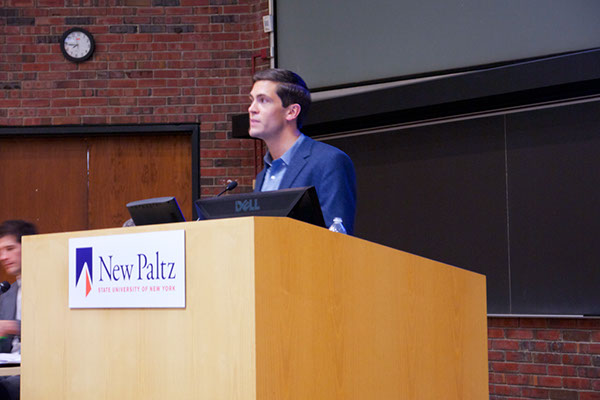

An assembly of various ages and backgrounds joined together in Lecture Center 100 on Wednesday, Oct. 1 to hear Congressman Chris Gibson of the 19th District of New York and incumbent challenger Sean Eldridge address environmental issues.
A panel consisting of the Director of Public Policy for Science Hudson Andrew Bicking, WAMC’s Hudson Valley Bureau Chief Alison Dunne and President of Hudson Riverkeeper Paul Gallay asked the candidates’ positions on environmental issues and how their intended plans in office would address these issues.
Issues discussed included sustainability, hydraulic fracking, renewable energy, the Keystone Pipeline — a project which calls for crude oil to be transported to the United Sates — and other issues concerning the well-being of the community.
Twenty-eight-year-old Sean Eldridge was born on July 31, 1986 in Canada, later on moving to Ohio to grow up in the town of Toledo. Eldridge is the founder and president of Hudson River Ventures, an investment fund that works to help small businesses in the Hudson Valley thrive. The young candidate’s political experience includes being the communications director and political director of Freedom to Marry — an organization dedicated to winning marriage equality nation wide. Eldridge is also director of a super PAC dedicated towards curbing the influence of money away from political campaigns.
Chris Gibson is the current representative of the 19th District of New York. Born on May 13, 1964 in Rockville Centre, New York, Gibson grew up Columbia County, in the town of Kinderhook of New York. He has held previous office in the 20th District of New York and has had a 24-year Army career, currently holding the rank of Colonel. In Congress, Gibson serves on the House Agriculture Committee, the House Armed Services Committee and the Republican Policy Committee.
Moderated by Associate Vice President for Regional Engagement at SUNY New Paltz Dr. Gerald Benjamin, the event allowed candidates a three to five minute opening statement, followed by questions by the panel, expected to be answered in a 90-second time frame. After questions from the audience, the candidates could make a two-minute closing statement. Candidates were not on stage at the same time, opting for a forum style event.
“We are living literally with the least productive Congress in the history of our country,” Eldridge said. “We are kicking the can down the road on pretty much every major issue you can think of.”
Expressing his dissatisfaction with the current Congress, Eldridge said that there is very little care for environmental issues from those in the “Tea Party House.” Eldridge offered his respects to Gibson, mentioning that the current congressman did in fact have a record of voting 33 percent yes on environmental issues. However, Eldridge did not hesitate to make it known to the audience that Gibson favors fracking and has received thousands of dollars in contributions from companies that support fracking. Eldridge also reported that Gibson signed the Koch Brothers Climate Pledge. The Koch Brothers are an industry that has been monetizing fracking.
“It is a promise that he [Gibson] has made to the Koch brothers to take no action, no vote on climate change that would hurt their bottom line,” Eldridge said. “A lot has been written on how this Koch Brother Pledge is why we’ve seen no action on climate change.”
Eldridge then addressed regional priorities for “the development of trails and conservation of open spaces,” in contrast to Gibson’s view.
“We can wait five years or 25 years to move to renewable energy, let’s do it now,” Eldridge said. “We have to do whats right for the people, not for the Koch Brothers.”
According to Eldridge, many of these issues have been addressed and fixed by the people of the county and town. He said he believes the federal government should be a partner in helping this. These issues also included the concern for small farms, the lack of young farmers and the conservation of farmland. Eldridge maintained a caring captivation for these small, family-owned farms, as he continued to outline his plans for change.
In opposition to Eldridge’s view that there is not enough being done for the environment, Gibson appeared optimistic and positive that we are already halfway there in making real change.
“When it comes to reducing admissions of power plants, I think we actually have an achievable goal there,” Gibson said. “We are a country that can do hard things. The coal industry has even improved because we pressured them to improve.”
Although met with discontent from the audience, Gibson said that as a member of the Republican party he has the capability to change the party’s ideals toward environmental support. Alongside issues concerning the region privately was Gibson’s concern for the environment and his support for policies such as the Safe Drinking Water Act and projects such as the democratization of renewable energy.
Gibson added that Eldridge’s talk of anti-fracking and criticism to those who support fracking, was “talking the talk, but not walking the walk.”
“For [Eldridge] to say that he’s opposed to fracking, when he’s part owner of the major companies that do fracking — he’s the part of owner of the banks that finance it, and he is part owner of the companies that move it,” Gibson said. “With all his concern for fracking, why is it OK for him to profit from it?”
The general election for Congress will be held on Nov. 4, 2014.
